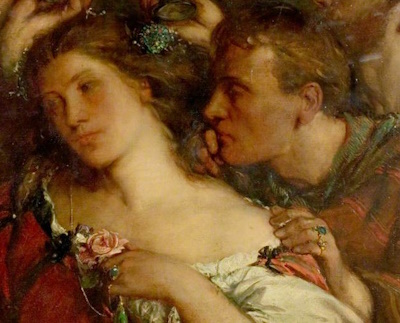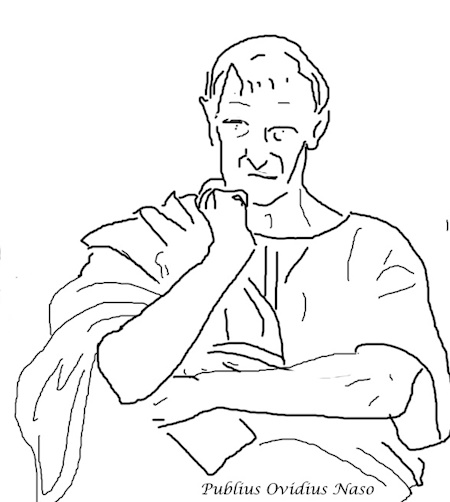
Elegy for Tibullus
Amores 3:9

Tibullus in the House of Delia
- Charles Haslewood Shannon (1863Ė1937)
If Memnonís or Achillesí mother wept,
If human prayers can somehow intercept
The gods, if gods can weep, then Elegy,
Whose name now proves its etymology,
Untie your hair in grief. Your voice, your fame,
Tibullus lies inert above the flame.
And therefore arrowless comes Venusí boy,
His torch extinct, his bow a broken toy.
His wings droop wretchedly; his painís so great
He strikes himself as though his grief were hate.
His hairís unloosed, he utters fevered cries
And gasps out tearful broken threnodies.
Julus, Tibullus
was like you, another
Of Venusí children Ė great Aeneasí brother.
And Venus herself, who even when the boar
Savaged Adonis, never suffered more.
Some call a poet holy, say that we
Are favoured creatures of a deity
(Some even think gods send our poetry)
But thereís no holy thing death canít profane,
Nothing at all his greedy hand wonít stain.
Tell me, did Zeus or did Calliope
Profit pathetic Orpheus finally?
His songs stilled forest beasts, but never could
Prevent ĎAi lenuí sounding through the wood.
ĎAi lenu Linus,í Phoebus, musicís king
Must order his reluctant lyre to sing.
And think of Homer now, the fount from whom
Poets drink freshness still. The tomb
Devoured him too; his songs alone were not
Condemned to burning or to rot.
The work survives, those stories of Troyís fight
And of the queen who cunningly at night
Slowly unwove her stratagem of lace,
Prolonging thus to years her waiting days.
So Nemesis will be known and Delia sung
As long as men feel deeply or love young.
What use are dirges or funereal rites?
What use the sleeplessness of lonely nights?
Truth must apologise, so pardon me,
But when death takes the best, Iím forced to see
That the gods are dead. Live by the moral laws,
Then morally youíll slide towards deathís maws.
By all means pray as an earnest of devotion,
But donít think that will halt your graveward motion.
Put faith in poetry? This urn contains
A little ash Ė Tibullusís remains.
Our best-loved poet, has the funeral flame
Truly consumed you? Has it felt no shame
When feeding on your heart? To devastate
Godsí temples would have been a crime less great.
Venus on Eryx hid her face away,
So copious were her salty tears, they say.
Yet better to be buried here than thrown
Upon some foreign shore, among the unknown.
For here a mother closed his dying eyes
And gave his ash the precious obsequies.
Here too a sister with dishevelled hair
Came wailing to her motherís side, to share
The dreadful grief, and to them his first love,
And Nemesis. Said Delia: ĎBlessed above
All women am I to have been his one
And most enduring love.í But, not outdone,
His Nemesis cried: ĎThis is my source of pride:
Mine was the hand he clung to as he died.í
After death what survives? A name, a ghost?
If more, Tibullus has deserved it most.
In the Elysian vales, Catullus, meet him
With laurel for his brows, and, Calvus, greet him
One like yourself, a poet rich in learning.
Tibullus, such poetic and discerning
Shades are your only fit companions now.
And us? We simply hope the Fates allow
Your ashes peace, while all that we who love you
Can do is pray the earth lies light above you.
P. Ovidius Naso
If you have any thoughts about this poem, George
Simmers, the translator, would be pleased to hear them

Drawing by Bruno Vars.



